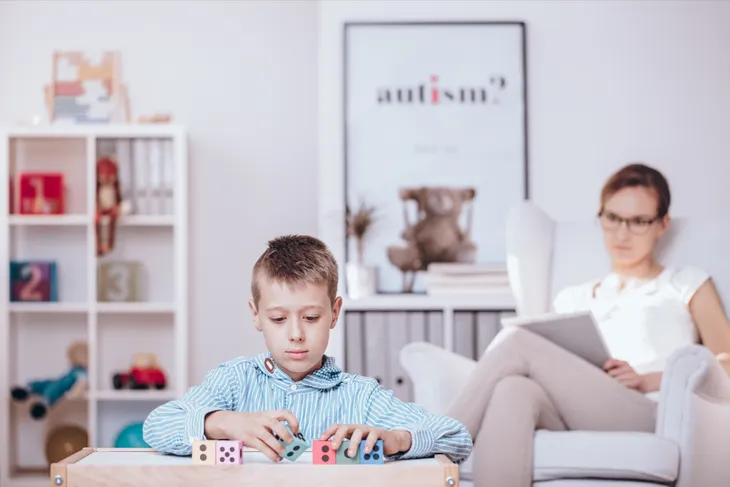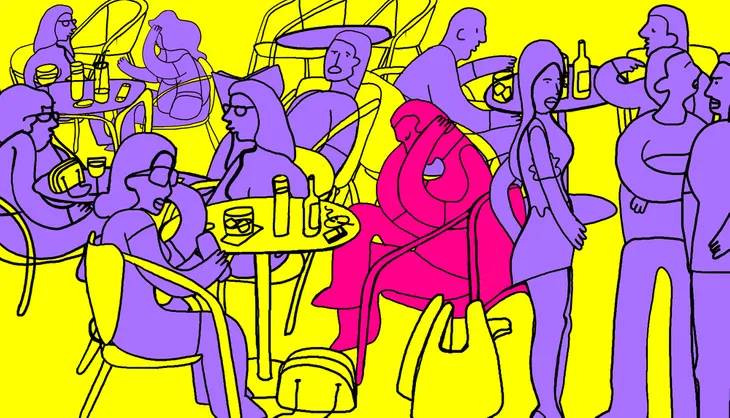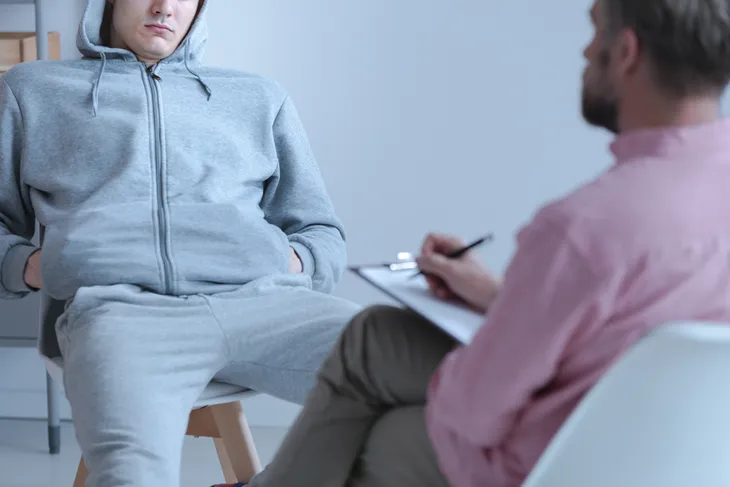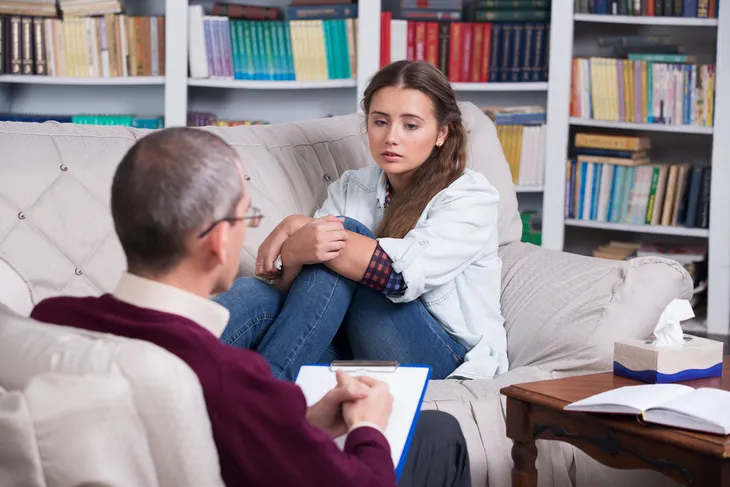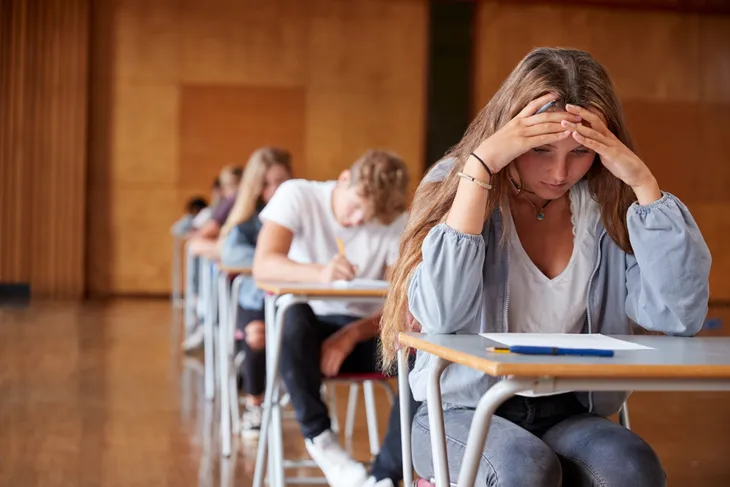Being a teenager isn’t easy. It’s a period in life that is full of major transitions, so life can get a little overwhelming. All these hormonal changes mean it’s not unusual for teenagers to be moody from time to time, and unfortunately, mental illness is not that uncommon in teenagers. The National Institute of Mental Health estimates about 1 in 5 children will have or already have a mental illness at some point in their lives. WebMD also adds that “about 20-percent of American children suffer from a diagnosable mental illness during a given year.”
Thankfully, most mental illnesses are treatable. The tricky part is getting a diagnosis. Many children don’t receive the help they need because unlike a physical injury or illness, the signs and symptoms of a mental illness can be hard to identify. This is why it’s so important to get informed on all the warning signs.
Here’s a look at the most common mental illnesses found in teenagers and the signs and symptoms for each.
Anxiety Disorders
Anxiety is a common emotion. We’ve all experienced it before. However, for many people, anxiety is a constant struggle that interferes with daily activities. There are several different types of anxiety disorders, from generalized anxiety disorder to social phobia, or even obsessive-compulsive disorder. The Mayo Clinic explains that some level of worry in children and teenagers is normal. It’s to be expected. Parents should only become concerned when their child’s worry or stress makes it hard for them to function normally. It can affect their social life, academic life, and even impact whether or not they want to leave the house.
According to Addiction Center, one in eight children are affected by some kind of anxiety disorder, yet only 20-percent receive any treatment. One of the most common anxiety disorders in teens is generalized anxiety, says Penn Medicine. Generalized anxiety disorder will cause a person to excessively worry about everyday matters. WebMD also adds that they may exhibit physical signs, such as a rapid heartbeat or sweating. A teenager with generalized anxiety disorder will struggle to concentrate at school, be extremely irritable, experience muscle tension, and have trouble falling asleep, staying asleep, and as a result become easily fatigued throughout the day.
VeryWell Family says that talk therapy is often used to treat anxiety disorders. During this type of therapy, teenagers can learn important skills that will help them manage their symptoms and give them the courage to face their fears.
Depression
We all get sad from time to time, but usually it passes with time. The difference with depression is that these feelings of sadness won’t go away. Results from SAMHSA’s National Survey on Drug Use and Health showed that around 8-percent of children between the ages of 12 and 17 have had a major depressive episode at some point during the past year. It also found that girls are more likely to experience depression than boys.
VeryWell Family explains that there are four different types of depression. “And about half of teens who meet the criteria for depression report that their symptoms severely impact their social or academic life,” writes the source.” A teenager suffering from depression may experience persistent feelings of sadness, anxiety, and emptiness. They will likely be irritable, restless, struggle with fatigue and an overall lack of energy. They may lose interest in activities or hobbies that once interested them, may experience changes in appetite or weight, begin to talk slower than usual, and struggle with memory and concentration. They will likely become overly pessimistic, experience feelings of hopelessness, a loss of self-esteem, and in severe cases have suicidal thoughts.
Luckily depression is quite treatable. Sometimes it can be treated through therapy alone, but other times a combination of medication and therapy is needed. Do not let depression go untreated because it can get worse and become life threatening.
Attention Deficit-Hyperactivity Disorder
Children and teenagers with attention deficit-hyperactivity disorder (ADHD) will have difficulty concentrating, paying attention, and likely suffer from hyperactivity and impulsive behavior. The Mayo Clinic points out that while some kids with ADHD will have all of these symptoms in all these categories, it is possible for them to only have a few. The Centers of Disease Control and Prevention (CDC) says approximately 11-percent of children between the ages of 4 and 17 will be diagnosed with ADHD.
In most cases this disorder will be diagnosed in childhood, typically around the age of 4, but in some cases it goes undiagnosed because their symptoms don’t become overly problematic until they reach their teenage years. The most obvious symptoms are showcased in their academic life as the work becomes more difficult, explains VeryWell Family.
The source goes on to explain that there are two different subtypes of ADHD: hyperactive and inattentive. It’s possible to have a combination of both. Teenagers with hyperactive will have difficulty sitting still, they will struggle with not talking, completing projects on a deadline, and will often lack focus and be easily distracted. Luckily, ADHD is treatable. It can be controlled with medication and therapy. Some degree of parent training may also be required in order to help the family manage these symptoms at home.
Eating Disorders
Body image issues have long been a major concern for teenagers, but nowadays with social media, things are getting worse. In some cases, these body image issues can sometimes lead to eating disorders. According to the National Institute of Mental Health, 2.7-percent of teenagers between the ages of 13 and 18 suffer from an eating disorder. While these disorders can occur in both men and women, they are more likely to occur in females. The most common eating disorders are anorexia nervosa, bulimia, and binge-eating disorders. All of these are serious, says the Mayo Clinic, and some even life threatening. “Children can become so preoccupied with food and weight that they focus on little else,” writes the source.
When it comes to anorexia, HealthyChildren.org tells parents to watch for “avoidance of food and noticeable changes in eating habits.” Bulimia on the other hand is when a person purges their food after eating (they may also use laxatives), so you might not notice that their eating habits change. Keep an eye on dramatic weight loss, as well as if they are making trips to the bathroom or some other private spot immediately after eating. Binge eating disorder involves eating massive amounts of food at one time.
It is extremely important to treat an eating disorder because it can take a serious toll on a teenager’s body. The longer it goes on, the harder it becomes to treat. The treatment for eating disorders typically involves both physical monitoring and intense therapy, says VeryWell Family.
Mood Disorders
Mood disorders are a group of mental health problems. Stanford Children’s Health provides a list of the most common mood disorders in teenagers which includes major depression, persistent depressive disorder (dysthymia), bipolar disorder, disruptive mood dysregulation disorder, premenstrual dysmorphic disorder, a mood disorder that is caused by a health problem, or a substance-induced mood disorder.
The source notes that the exact cause of mood disorders is unknown, but in some cases they are a result of an imbalance of chemicals in the brain. Chemical imbalances can occur on their own or be influenced by environmental factors, such as an unexpected life event or long-lasting stress. They can also run in families. Stanford Children’s Health provides a list of signs to look for when it comes to mood disorders. While every person feels sad or depressed at times, teenagers with mood disorders will experience these emotions on much more intense scales. The most common symptoms are “ongoing feelings of sadness, feelings of despair, helplessness, or guilt, low self-esteem, feelings of not being good enough, wanting to die, loss of interest in normal activities once enjoyed, a drop in energy, sleep problems,” and the list goes on.
Treatment for mood disorders in teens will vary on their general health, age, and the severity of their condition, says the source. They can often be helped with medicine, talk therapy, family therapy, or school input. In some cases all it takes is one, or possibly a combination.
Autism Spectrum Disorder
As we learn more about autism spectrum disorder (ASD) it’s becoming easier and easier to catch in the early childhood years. ASD is a “serious developmental disorder that appears in early childhood — usually before age 3. Though symptoms and severity vary, ASD always affects a child’s ability to communicate and interact with others,” writes the Mayo Clinic. It’s important to remember that autism is a spectrum disorder so it may look different in each child.
The National Institute of Mental Health provides a detailed list of signs and symptoms under two major categories: social communication and restrictive, repetitive behaviors. A child with ASD will likely repeat certain behaviors or have unusual behaviors. They may have a long and lasting interest in certain specific topics, get upset about changes in routine, be extremely sensitive to sensory input, avoid eye contact with others, showcase facial expressions that do not match what they are saying, difficulty with conversation, and trouble understanding other people’s point of view, just to name a few.
Social Phobia or Social Anxiety
Nowadays with social media and online chatting, it seems like most young people struggle with some level of social anxiety, and it’s becoming a common problem among teenagers. Social anxiety causes teenagers to feel extremely self-conscious. They will be constantly in fear of humiliation, embarrassment, rejection, or even offending others, says Penn Medicine. While most of us are afraid of being judged by our peers in some way or another, teenagers with social anxiety will be plagued with worry about judgement by others. They will feel anxious for days leading up to a social event and often avoid going to places where they might have to interact with people, explains the source.
Not surprisingly, all of this will have a severe impact on their social life. Teenagers with social anxiety will likely not have many friends. When they are in social situations, they may exhibit physical symptoms like blushing, sweating, and even trembling. In severe cases, social situations may even cause them to feel so overwhelmed that they become nauseous.
Oppositional Defiant Disorder
Oppositional defiant disorder (ODD) can be even trickier than others to identify because the symptoms can be similar to the typical moodiness and defiance of teenagers. It is characterized by “extreme defiance, verbal and physical aggression and spitefulness,” writes VeryWell Family. To help differentiate what is considered normal behavior and what is ODD, parents should look to their child’s relationships. Someone with ODD will have trouble maintaining healthy relationships and their behavior often interferes with their ability to succeed at school.
The percentage of adolescents with ODD is somewhere from between 1- and 16-percent of teens, says the American Academy of Child and Adolescent Psychiatry. In most cases, this type of behavior will begin to showcase in early elementary school. If it goes untreated, VeryWell Family says it can become worse and lead to a conduct disorder, “which is a much more serious behavioral disorder.” To treat ODD, parents will likely have to enroll in training programs and therapy, alongside their child.
What Causes Mental Illness?
Many parents have difficulty accepting that their child has a mental illness, or may struggle with feelings of failure and defeat. They may wonder if their child’s diagnosis is a result of something they did or didn’t do along the way. According to WebMD, the exact cause of mental illness is unknown, especially because there are a vast majority of illnesses that are all different in their own way. However, there are a variety of factors that come into play including heredity, biology, psychological trauma, as well as environmental stress.
In some cases mental illness is unavoidable because it runs in the family. Having a history of mental illness in the family doesn’t necessarily mean a child will develop a mental disorder. It simply means their likelihood is increased. Similarly, some mental illnesses have been linked to chemicals in the brain called neurotransmitters. “Neurotransmitters help nerve cells in the brain communicate with each other,” writes WebMD. “If these chemicals are out of balance or not working properly, messages may not make it through the brain correctly, leading to symptoms.” If the child had an injury to their brain or some kind of defect, this could also impact their mental health.
Other factors are psychological trauma or environmental stress. Parents should ensure that their child is growing up in a healthy environment because stressful or traumatic events can trigger a mental illness, particularly in someone who is already vulnerable to one (i.e., family history). Some mental illnesses are triggered by psychological trauma such as emotional, physical, or sexual abuse, or if a child loses a parent at a young age or suffers through neglect at the hands of a family member.
Red Flags to Watch For
Healthychildren.org provides a list of red flags that parents should watch for when it comes to mental illness in teenagers. These are signs that are found in several of the illnesses listed on here and are things that are outside the norm of the typical changes we’d see in an adolescent. This first one is excessive sleeping. However, keep in mind that it’s not unusual for a teenager to sleep more than they did as a child. The kind of fatigue we’re talking about would be an excessive amount — beyond just sleeping in a bit later in the morning. Excessive sleep can be a sign of substance abuse or depression. You should also look for difficulty sleeping, insomnia, or any other changes in their sleeping habits.
Watch for a change in interest or abandonment of hobbies. Naturally as a teenager they may grow out of certain interests they had as a child. The changes we’re talking about would be if they were once very passionate about playing a specific sport or club and then all of the sudden, they stop. Be vigilant about monitoring their academic performance at school. Note any dramatic changes in their weight or appetite, as well as any mood changes (i.e., sadness or withdrawal), intense feelings (i.e., fear for no reason, overwhelming worry), or behavior changes (i.e., aggressiveness or extreme anger). Parents should use their own judgement on what is normal and what isn’t as they are likely the best person to evaluate what would be considered “off” or “unusual” for their own child.
Tips for Managing Mental Illness
In many cases, teenagers are plagued with the signs and symptoms of mental illness for months before they are even brought in to see a doctor. This is because many parents struggle to accept that their child may be suffering from a mental illness. As a parent, it’s important to know that while mental illness in teens is common, it’s also treatable.
Anytime there has been a significant change in your teenager’s behavior, you should address it with them. Create an open line of communication with them that is constant and honest, says HealthyChildren.org. A common problem between teenagers and parents is a lack of communication. Make sure your child knows they can talk to you about anything and everything. While it may be uncomfortable to address mental illness with your child, it’s important to talk to them about any red flags you’ve been seeing. To make them feel more comfortable, try to relate to them by reminding them you were once a teenager too who experienced similar fears and emotions. Invite them to share their own experiences and be careful not to accuse them of anything or make them feel like it’s their fault, says VeryWell Mind. Don’t be surprised or offended if they insist nothing is wrong or become irritated. Many people, teenagers especially, can become embarrassed, ashamed, or afraid when talking about mental illness, adds the source.
Another tip for parents on HealthyChildren.org is to be attentive with your teenager. Find a comfortable middle ground where you are giving your teenager the space they desire, while also keeping a close watch on their behavior. If you’re ever concerned that your teen may be struggling with a mental illness, schedule an appointment with your doctor. If they are diagnosed with a mental illness, they will likely be treated with a combination of counselling and medication.






